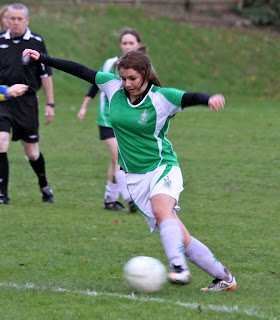A Brief History.
 |
| The North-London team. Nettie Honeyball is the second from the left in the top row. |
"True, young men would run harder and kick more strongly, but, beyond this, I cannot believe that they would show any greater knowledge of the game or skill in its execution. I don't think the lady footballer is to be snuffed out by a number of leading articles written by old men out of sympathy both with football as a game and the aspirations of the young new women. If the lady footballer dies, she will die hard."
This statement doesn't deem any truer. In theory, one could say that men's football and women's football are two very different sports. This is due to two extremely crucial differences: anatomy, and funding. The male body is obviously structured to succumb physical intensiveness, with their higher muscle capacity makes their agility and strength more obvious on the field. Women have less muscle capacity and are, generally, not as strong, making the female game not as physical and slightly slower. Moreover, FUNDING. The best coaches go to the men's teams, where women have to settle for less specialised and technical work. It is for these reasons that female players are stuck where they are: a slight mockery and comparably less significant in the sporting world. If more money and time is not invested into women's football, the same old stereotype will continue to exist.
The biggest crowd to date for a women's football match was in 1920 on Boxing Day, where Preston-based Dick Kerr's Ladies had an audience of 53 000 whilst they beat St Helen's Ladies 4-0. To many people's frustration, Ladies Football was banned from playing on Football League grounds in 1921 by the FA, claiming: “…the game of football is quite unsuitable for females and ought not to be encouraged." I wish I was there at the time to ask who the hell has the authority to decide that women playing football is 'unsuitable.' What is the deciding factor, actually?
It was only in 1971 when the ban was lifted. For 50 years, women were forbidden to play on the grounds of affiliated clubs. This relates back to my point about funding: whilst men's football has been funded since it began, women's football had a half a century exclusion from any investment into the sport they wanted to play and develop in (sharing the same motives and desires as the men). This immediately categorises women's football as significantly less prominent, and this still seems to be evident today. Whilst I will agree that it is growing in popularity and is slowly becoming more recognised, it will never be at the same or a similar level as men's football, because not many are willing support the notion.
England has the greatest history in women's football, where women were playing during the war and men were attending matches to pick out wives based on their ability to play. However, it does not mean that a similar culture can't be created in countries all over the world. I sure as hell wish South Africa's Banyana Banyana could be respected in the same way England's female team is. Why can't women
playing football be appealing to the people of today, especially the men? Why can't it be supported and admired in the same way as men's football? These are questions which will continue to keep me awake at night.
More to come,
Gabi.
If you have anything to ask or comments to make, please don't hesitate; I value any extra insight and perspective.
Twitter: @Gabiblombard
Sources:
http://www.thefa.com/GetIntoFootball/Players/PlayersPages/WomensAndGirls/History_of_womens_football.aspx
http://www.spartacus.schoolnet.co.uk/Fwomen.htm


